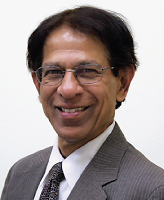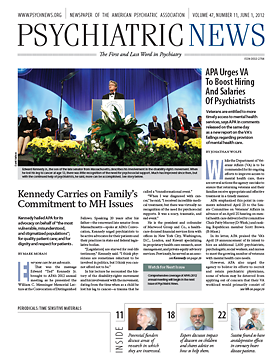I am honored to serve as the president of APA for the coming year. It is a great privilege and a great opportunity. In my first column for Psychiatric News as APA president, I would like to introduce myself to the readers.
I am a psychiatrist specializing in geriatric psychiatry, based in San Diego, Calif. (Notwithstanding some competition, San Diegans call this America’s Finest City!) My journey toward becoming a psychiatrist began in India. I was born in a village in the state of Maharashtra. As a teenager, I happened to read Sigmund Freud’s books for lay people, such as those on interpretation of dreams and everyday errors of life. Freud’s insights into common daily experiences seemed both captivating and intriguing—like detective stories. Instead of solving murder mysteries, they sought to uncover secrets of mind using behavioral clues. Fascination with Freud’s work shaped my desire to try to understand the human mind and brain. In a nonphysician family, I enrolled in medical school with the explicit goal of becoming a psychiatrist, a choice that was considered by some to be rather strange, to put it mildly.
I earned my medical degree from B. J. Medical College in Pune and completed psychiatry training at Seth G.S. Medical College in Mumbai, India. Two of my mentors there had received psychiatric training in the United States. We all read the American Handbook of Psychiatry and looked forward to getting each new issue of the American Journal of Psychiatry as if it were a new edition of the Bible. To pursue a career in academic psychiatry, I emigrated to the United States with my wife, Sonali, who had just completed her medical education. We had relatively few resources other than an accented (pun intended) desire to learn and grow. I did my psychiatry residency at New Jersey Medical School and Cornell University, neurology residency at George Washington University, and research fellowship at the National Institute of Mental Health. Afterward I joined the faculty of the University of California, San Diego (UCSD).
APA has long been an important part of my professional life. I became an APA member while I was a resident. Since then I have rarely missed an APA annual meeting. I have been involved in numerous APA activities over the years and became a member of its Board of Trustees four years ago.
At UCSD, my interest in geriatric psychiatry was driven, in part, by a realization of the public-health significance of geriatric care in view of the aging of the population. Starting with one fellow, we developed a geriatric psychiatry program at UCSD and VA San Diego Healthcare System. Today it is the Geriatric Psychiatry Division, with clinical, research, and training components. It includes the Senior Behavioral Health Program, led by my colleague Dan Sewell, and provides comprehensive clinical care to older people with neuropsychiatric disorders. I also direct the Sam and Rose Stein Institute for Research on Aging—a multidisciplinary institute at UCSD dedicated to the development and application of the latest advances in biomedical and behavioral science to issues of successful, healthy aging.
I take pride in having mentored (and learned from) a large number of young trainees, many of them women and members of minority groups, who have gone into various aspects of American psychiatry—clinical, academic, and administrative. Over the past three decades, my research areas have ranged from neuroscience to community psychiatry, and from schizophrenia to successful aging. My recent interest has focused on understanding and enhancing successful psychosocial aging and aging-related wisdom in people with or without mental illness. A sizable proportion of older adults in the community function at a high level, making major contributions to society. Even in a serious mental illness like schizophrenia, psychosocial functioning tends to improve with aging—if there is optimal psychosocial management.
Our group has developed evidence-based therapies such as cognitive-behavioral therapy combined with social-skills training, functional adaptation skills training, and cognitive training to aid work rehabilitation in middle-aged and older adults with schizophrenia. These NIH-funded randomized, controlled trials, with results published in peer-reviewed journals, have demonstrated the efficacy of psychosocial interventions for schizophrenia in later life. We partner with the San Diego County public mental health system, which serves about 40,000 seriously mentally ill adults, to attempt implementation of such treatments in the community setting. The goal of future investigations will be to understand the nuances of these processes and to translate discoveries into better prevention and treatment strategies, hoping to make successful psychosocial aging a norm in our society.
I am grateful to all APA members for their trust and faith in my ability to lead APA. I look forward to working with you, continuing our dialogue through this column. We must be united to help APA succeed in its mission to serve our patients. Thank you.


